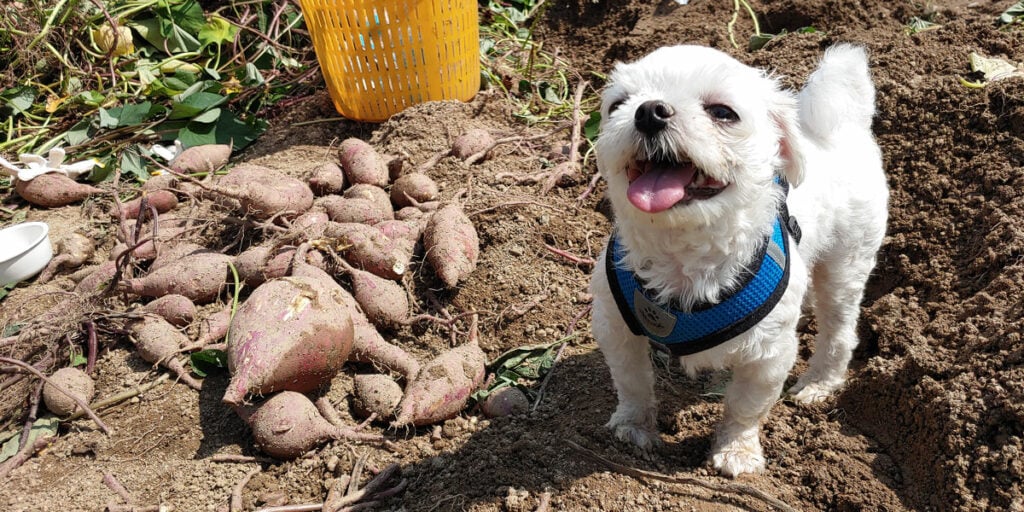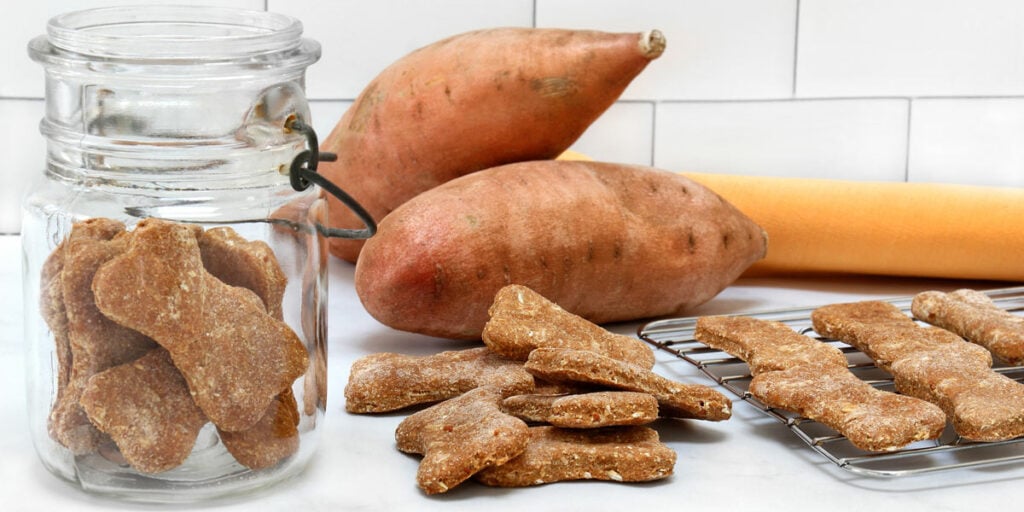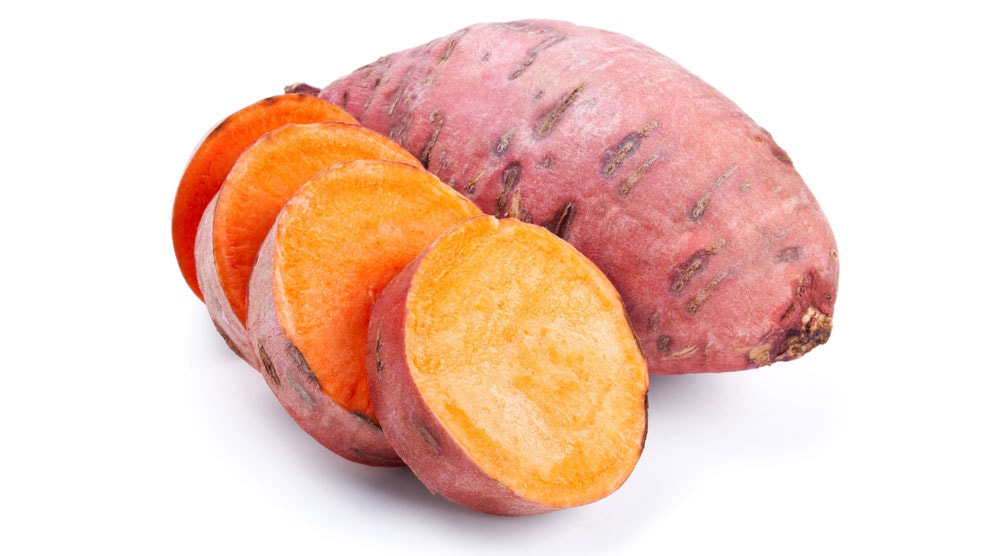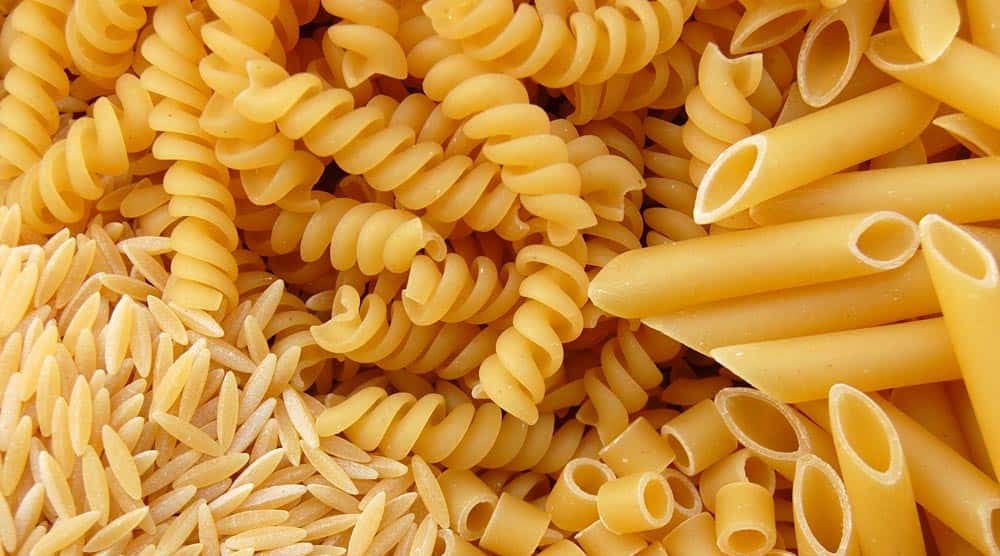Quick Answer
- Sweet potatoes are not considered toxic to dogs. In fact, they can be a nutritious treat when given in moderation.
- Sweet potatoes contain a range of beneficial nutrients for dogs, including fiber, vitamin C, and vitamin B6.
- You should only give your dog sweet potatoes that have been peeled, cooked, and are unseasoned. It’s also important that this food is only given as an occasional treat.
The good news is that sweet potatoes are not toxic for dogs. This vegetable has become a popular addition to dog foods in recent years, due to its high fiber, low fat content, and essential vitamins (such as calcium, vitamin C, vitamin B6, and beta-carotene.)
It has been suggested that a link between canine dilated cardiomyopathy and low-grain diets could mean sweet potatoes aren’t as safe for dogs as once thought. However, there is currently no evidence that directly links sweet potatoes with this condition in dogs.
Let’s take a closer look at whether dogs can eat sweet potatoes, the nutritional benefits of this vegetable, and whether there are any risks to this food.
Contents
Can Dogs Eat Sweet Potatoes?
Yes, dogs can safely eat sweet potatoes. This natural treat is a healthy food for dogs, and it also has a sweetness that many pooches love.
Some of the benefits of sweet potatoes include high fiber content, which supports the dog’s digestive system, and vitamins C, A, and B6. Sweet potato is also low in unhealthy fats.
Nutritional Benefits of Sweet Potatoes for Dogs

Sweet potatoes are a healthy snack for dogs. They’re packed with nutrients and are a great natural source of fiber. This is why many dog treats or dog foods include sweet potato, but it can also be a healthy whole-food snack for your pet.
We asked veterinary surgeon Dr Linda Simon for her thoughts about sweet potatoes. “Sweet potatoes are a root vegetable that provides various health benefits for dogs. When eaten after boiling, they slowly release carbohydrates, which are an important energy source and help dogs feel full after a meal. They also contain a range of vitamins and minerals including B-vitamins, vitamin C, calcium, and potassium.”
Here are some of the nutritional benefits of sweet potatoes for dogs:
- High in Dietary Fiber. As long as your dog doesn’t eat excessive amounts of fiber, it can help ensure they have a healthy digestive system and problem-free bowel movements. A sweet potato contains at least 3 grams of fiber, making it an excellent food for supporting your dog’s digestion. High fiber foods can also cause your dog to feel fuller for longer.
- Vitamin C. Sweet potatoes have a high quantity of this vitamin. Although Tufts claims that dogs produce it naturally, unlike us humans, adding a little extra could help promote a healthy immune system. Care should be taken, however, not to over supplement Vitamin C.
- Manganese. As long as it isn’t given in excessive quantities, this mineral is known to help dogs metabolize carbs and proteins effectively. According to PetMd, it’s beneficial for the development of healthy bones and joints.
- Vitamin B6. Skin barrier function can be improved when this vitamin is added to the diet. According to Veterinary Practice, this can be helpful for dogs suffering from dry and flaky skin. Some research has even suggested it may help to calm anxious dogs.
- Beta-carotene. Sweet potatoes have high quantities of this antioxidant. It converts to vitamin A, and this promotes healthy eyes and bones. In fact, each molecule of beta-carotene converts into two Vitamin A molecules, making sweet potatoes a great source of this important nutrient.
“Sweet potatoes are also low in fat,” says Dr Simon. “So, they can be a great option for dogs on a restricted calorie diet. Boiled sweet potatoes are also generally suitable for dogs who are prone to pancreatitis.”
If you do occasionally offer your dog some sweet potato, make sure it’s peeled and cooked (ideally boiled). Although sweet potato skin has nutritional value, it’s also tough and can be difficult for your dog to digest. Avoid feeding sweet potato fries or sweet potato chips, especially if they are salted.
Additionally, it’s important only to give baked, mashed, or boiled potatoes to your dog as an occasional treat. Start by giving them a small amount of sweet potato to check they enjoy the taste and aren’t sensitive to this type of food. You can also try adding a small amount of sweet potato to their regular kibble or wet food.
Fun Fact: Sweet potatoes contain more nutrients than white potatoes. So, while white potatoes are cheaper, they are not as healthy for your pet.

Sweet Potato Nutritional Information
According to WebMd, sweet potatoes contain the following nutrients per serving (for one medium size sweet potato):
- 112 calories
- 0.07 grams of fat
- 26 grams of carbohydrates
- 3.9 grams of fiber
- 2 grams of protein
As you can see, this means that sweet potatoes are a high carbohydrate food.
Are There Any Dangers to Dogs Eating Sweet Potato?

Unseasoned, cooked sweet potatoes aren’t toxic for your dog. If your dog eats some as a one-off, it’s unlikely to cause harm.
You should be more vigilant if the sweet potatoes have been cooked in seasoning or fried. According to a 2008 study by Companion Animal Medicine, too much salt can lead to dehydration and can be a particular problem for dogs with renal conditions.
Seasonings also often contain onions, garlic, and other ingredients that are toxic for dogs. Your pet would need to eat a lot of these substances to be in serious danger though.
“It is unlikely for a dog to develop onion or garlic toxicity after a one-off ingestion of seasoned sweet potato,” says Dr Linda Simon, a veterinary surgeon in the UK. “Dogs need to eat more than 5g/kg to experience toxic effects, which is a considerable amount of seasoning to get through in one sitting.”
Despite being non-toxic, even plain sweet potatoes carry some potential risks – especially as they are high carbohydrate foods with a high glycemic index. Here are four to be aware of before feeding your dog this food.
1. Linked to Canine Dilated Cardiomyopathy (DCM)?
Some studies have suggested that eating grain-free diets, which often contain sweet potato, could increase the risk of a dog developing canine dilated cardiomyopathy (DCM.)
Before we explain why this isn’t as worrying as it sounds, what exactly is DCM?
Canine dilated cardiomyopathy is a heart disease that affects the heart muscle’s ability to contract. Over time, the heart can’t pump enough blood around the body, which, according to Veterinary Partner, causes fluid to be retained in either the lungs or the belly. It’s a serious condition which, unfortunately, leads to congestive heart failure.
In the past, DCM was thought to be a genetic condition. The new studies suggest there could be a link between this disease and dogs being fed low-grain diets. This has led to some speculation that legumes, sweet potatoes, and other foods included in these diets might increase the risk of DCM.
However, there is no direct evidence that sweet potatoes cause DCM. “The studies suggest that those who are eating grain-free diets (some containing sweet potato) could be at higher risk of DCM, but there is no proven link stating sweet potatoes can cause this condition,” says Dr Simon.
“The researchers are looking into a range of potential causes, including the consumption of legumes, a taurine deficiency, or a lack of grains. For this reason, I am not advising my dog owner clients to avoid or limit sweet potato consumption in healthy dogs, as there is no evidence we need to do this,” says Dr Simon.

What About Dogs Prone to DCM?
We’ve established that there is little or no evidence linking DCM and sweet potatoes. But are there any situations where it’s best to avoid sweet potatoes?
“If a dog is a breed prone to DCM (like the Cocker Spaniel or Boxer), owners may choose to be more conservative regarding their dog’s diet,” says Dr Simon. “For these dogs, it makes sense to feed grains, and the owner might consider avoiding legumes or potatoes. A similar approach may be taken in a dog with close relatives diagnosed with DCM.”
“As there has been zero evidence of causation in any of the research undertaken, there is no need to limit sweet potato consumption in healthy dogs at this point,” she adds.
2. High Glycemic Index
The sweet potato has a high glycemic index (GI). High GI foods cause a spike in blood sugar levels, which can be a problem for diabetic dogs.
According to HealthLine, how sweet potatoes are cooked impacts their GI levels. Boiled sweet potatoes have a much lower GI; the longer they’re cooked, the lower they get. Roasted sweet potatoes have a higher GI level, while baked sweet potatoes have the highest.
If your dog has been diagnosed with diabetes, avoiding sweet potatoes altogether would be recommended.
3. High in Carbohydrates
Sweet potatoes contain large amounts of starchy carbohydrates. While carbohydrates are a naturally satiating food source and are a great source of energy, dogs do best when fed a diet containing moderate amounts of carbs.
Eating high quantities of carbohydrates could contribute to your dog becoming overweight. Plus, they aren’t part of a natural food group for canines. Your dog will benefit from a diet rich in protein and healthy fats.
“Most vets would recommend feeding carbohydrates in moderation, as they are a plentiful source of energy and are easily digested by most dogs,” says Dr Linda Simon. “I recommend diets that include sweet potato, rice, oats, and other grains to most of my canine clients.”
4. Allergies
Allergies are a potential concern when feeding your pet new foods, such as sweet potato – although this is unlikely to be an issue for most dogs.
“A sweet potato allergy or sensitivity would be uncommon,” says Dr Simon. “The more common food sensitivities we see in dogs include high protein foods such as chicken, beef, egg, dairy, and peas. I have personally never encountered a dog who was allergic or intolerant to sweet potatoes.”
“However, a dog can potentially be sensitive to any ingredient. Signs of a food sensitivity can include itchy skin, rash, loose poop, vomiting, bloating, and gas. It is wise to introduce any new ingredient slowly over a few days, checking for any reaction.”
How to Prepare Sweet Potato for Dogs

Steaming or boiling a sweet potato is the best way to prepare this vegetable for your dog to eat. Peeling the sweet potato first is a good idea, as the skin is harder for dogs to digest.
Cooking is essential for making the sweet potato easier to digest. You should never feed your dog raw sweet potatoes.
Don’t add seasoning to a sweet potato that you’re going to feed to your dog. Many seasonings can be unhealthy or even poisonous to your pet.
“A great way to serve sweet potatoes is to boil them, then mash and put them inside food puzzles, such as Kongs, or smeared onto lick mats,” adds Dr Simon.
How Much Sweet Potato Can You Feed a Dog?

Sweet potato is a healthy snack but should only be given to a dog in moderation and never as the primary calorie source.
“You can feed sweet potatoes to your dog regularly. Some dog foods even contain sweet potato as the primary carbohydrate source. I’d happily feed my own dog a diet containing sweet potato,” says Dr Simon.
“However, carbohydrates should only make up about 30-60% of a dog’s diet, so you don’t want to go overboard. Ideally, you should give your dog a protein-rich diet, rather than having carbohydrates as the main calorie source.”
“If offering sweet potato as a treat, I’d offer a toy breed dog a few teaspoons each time,” says Dr Simon. “A large breed could eat several tablespoons. If your dog has never had sweet potato before, offer small amounts for the first few servings, to ensure they are well tolerated.”
Types of Sweet Potato
Can Dogs Eat Raw Sweet Potatoes?
No, you should never give your dog raw sweet potatoes. Uncooked potatoes are much more difficult to digest, and their solid consistency makes them a choking hazard. Raw sweet potatoes could even cause intestinal blockages.
Can Dogs Eat Sweet Potato Fries?
No, dogs shouldn’t be given sweet potato fries. These are much higher in unhealthy fats, making them too high in calories and a potential trigger for pancreatitis.
Can Dogs Eat Sweet Potato Skins?
Sweet potato skins are not toxic to dogs, but they are more difficult for them to digest. For this reason, it’s best to peel a sweet potato before cooking it and giving it to your dog.
Summary
Cooked sweet potatoes are non-toxic to dogs. They may improve digestive health, due to the dietary fiber content, and contain a host of vitamins and minerals.
These properties make sweet potatoes a healthy snack for dogs. You should only feed sweet potatoes occasionally and in small amounts though.
While research has linked low-grain diets to canine dilated cardiomyopathy, there is no direct evidence showing this effect is caused by sweet potatoes.
“For me, the data is not compelling,” says Dr Linda Simon. “Given the evidence available, vets are not advised to suggest limiting or avoiding sweet potato consumption in healthy dogs. I am happy for owners to continue feeding sweet potatoes as normal to healthy dogs.”
Do you have any questions about whether dogs can eat sweet potatoes? Let us know in the comments section below.




